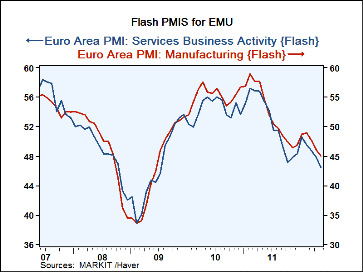 Global| May 24 2012
Global| May 24 2012EMU PMIs Continue to Sink
Summary
The EMU unravel is now in its second phase. The chart clearly shows the first phase drop for MFG from 58.6 to 46.38 followed by a bounce to 48.96 and now a drop to flash value of 45.03. The chart shows that the services sector has [...]
 The EMU unravel is now in its second phase. The chart clearly shows the first phase drop for MFG from 58.6 to 46.38
followed by a bounce to 48.96 and now a drop to flash value of 45.03.
The EMU unravel is now in its second phase. The chart clearly shows the first phase drop for MFG from 58.6 to 46.38
followed by a bounce to 48.96 and now a drop to flash value of 45.03.
The chart shows that the services sector has followed the same profile as for MFG.
If we assess the level of the MFG and Services relative to their historic variation the services index is weaker than this only 6% of that time and the MFG sector is weaker than this only 7.2% of the time. These are frequencies associated with the frequency of recession.
However, when the indices do tank in recessions they get a lot lower. Currently the MFG index sits in the 42nd percentile of its high-low range and the services reading stands in the 31st percentile of its high-low range.
In the recent recession the EMU MFG index was 25% lower than it is now and the service index was 17% lower than it is now. So while these indices are not often much lower when they do fall below this level in recession they can get to be a lot lower.
We do have a number of Euro-Area countries in recession and others skirting recession. But these PMI statistics as are for the Zone itself, as a whole, and they are troublesome.
Germany has generally been stronger than the rest of the Zone. But its index has weakened in this second part of the cycle with its MFG gauge to 45 from 46.2 and its services gauge at 52.2 and steady. Germany’s. MFG reading stands in the lower 9 percentile of its historic queue according to PMI metrics. But Germany’s domestic IFO survey is showing weakness as well, just not as much as the PMIs.
The IFO is not as weak as the PMI data. Ranked over the same period of time the IFO expectations reading stands in the 47th percentile of its queue. The current index stands in the 72nd percentile of its queue. Manufacturing is the weakest reading among sectors at the 61st percentile of tis queue- a fr cry for the 9th percentile. Services stand in the 79th percentile of their queue.
The PMI data are simply much weaker readings than other metrics on the European and German economies. We have already seen this in comparison with the EU commission readings (not yet available for May). So while there is a new ongoing deterioration it may not be quite as bad as the PMI readings are suggesting. And that would explain why things like consumer confidence are only collapsing in the countries we know to be extremely weak (like Italy Greece and Spain) not EMU-wide and not in Germany.
| FLASH Readings | ||
|---|---|---|
| Markit PMIs for the Euro-Area | ||
| MFG | Services | |
| May-12 | 45.03 | 46.51 |
| Apr-12 | 45.89 | 46.88 |
| Mar-12 | 47.72 | 49.20 |
| Feb-12 | 48.96 | 48.85 |
| Segment Averages | ||
| 3-Mo | 47.52 | 47.71 |
| 6-Mo | 47.44 | 48.57 |
| 12-Mo | 48.86 | 49.39 |
| 173-Mo Range | ||
| High | 60.47 | 62.36 |
| Low | 33.55 | 39.24 |
| % Range | 42.6% | 31.4% |
| Range: | 26.92 | 23.12 |
| AVERAGE | 51.36 | 53.51 |
| Queue % | 7.8% | 6.6% |
Robert Brusca
AuthorMore in Author Profile »Robert A. Brusca is Chief Economist of Fact and Opinion Economics, a consulting firm he founded in Manhattan. He has been an economist on Wall Street for over 25 years. He has visited central banking and large institutional clients in over 30 countries in his career as an economist. Mr. Brusca was a Divisional Research Chief at the Federal Reserve Bank of NY (Chief of the International Financial markets Division), a Fed Watcher at Irving Trust and Chief Economist at Nikko Securities International. He is widely quoted and appears in various media. Mr. Brusca holds an MA and Ph.D. in economics from Michigan State University and a BA in Economics from the University of Michigan. His research pursues his strong interests in non aligned policy economics as well as international economics. FAO Economics’ research targets investors to assist them in making better investment decisions in stocks, bonds and in a variety of international assets. The company does not manage money and has no conflicts in giving economic advice.
More Economy in Brief
 Global| Feb 05 2026
Global| Feb 05 2026Charts of the Week: Balanced Policy, Resilient Data and AI Narratives
by:Andrew Cates






